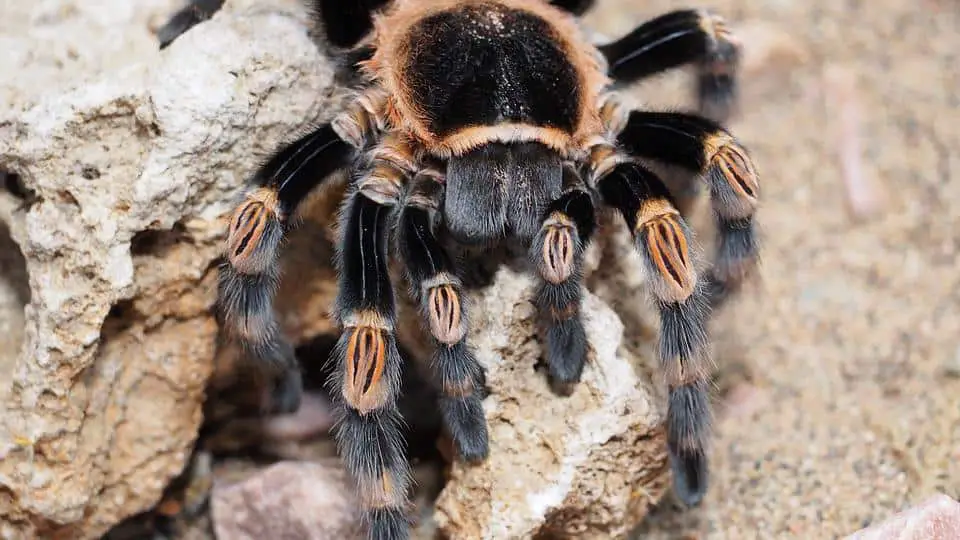Are tarantulas nocturnal or are they diurnal? Do tarantulas even sleep or are they awake 24 hours a day? These are important questions for prospective owners. It’s important to know when they are active, and when they’re not.
That way, you can know when you should leave it alone and when you can interact with it. It’s also crucial to know this information because otherwise, you don’t know when the ideal time to feed them is.
If your tarantula’s sleep is something you’ve been curious about, you’ve come to the right place. I’m going to go over everything you need to know about their sleep, activity, and more. Let’s dig in!

Are tarantulas nocturnal?
Yes, tarantulas are nocturnal, which is to say that they’re most active during the night. You see, these arachnids do not sleep the same way that many other animals do, more on that later.
Nevertheless, despite the fact that they do not sleep in the same way that humans do, they do prefer to come out at night in the cover of darkness.
However, there are quite a few species in captivity that do not seem to mind coming out during the day either. Especially captive New World species do not seem to mind being outside in the light all that much.
Tarantulas might be nocturnal, but males do leave their hides during the day for one very important part of life: mating.
When it’s time for the males to find a partner to mate with they will leave their burrow and walk large distances in search of a receptive female, these trips do not happen only at night, but also during the day.
This is a risky trip for them, not only because they’re more vulnerable to predators during daytime, but also because the female often ends up having the male as desert once the mating has completed!
Why are tarantulas nocturnal?
Most spiders are nocturnal. The reason why tarantulas, and most other spiders, are nocturnal is that they try to avoid their predators by hiding during the day.
The predators that prey on the tarantula depend on where they live – arboreal species have different predators than terrestrial species. Their main predators are large birds, foxes, coyotes, snakes, and lizards.
Most of these predators (except some snakes and lizards) are diurnal, meaning they hunt during the day.
Since most of their predators are active during the day and sleep at night, tarantulas can try to avoid contact with them by hiding in their burrows during the daytime.
If they were to venture out of their burrows during the day they would be easy prey for a bird flying over or a lizard roaming around.
In addition, tarantulas do not have very good eyesight. Because of this, their hunting strategy is not impacted by the dark of night all that much, while that of their prey is. This means that hunting at night, rather than during the day, gives them a distinct advantage when hunting because it makes it much more difficult for their prey to see them coming.
Also, they are ambush hunters, which is a strategy that works much more effectively at night because the cover of darkness makes it more difficult to see an ambush coming.
So, they are nocturnal for 2 reasons: it allows them to avoid predators, while at the same time making it easier for them to hunt their own prey.
Do tarantulas sleep?
Tarantulas do not sleep the same way that you, me, and most other animals do. They do not lay down, close their eyes, and fall into a deep slumber. In fact, since they do not have eyelids it’s impossible for them to close their eyelids in the first place.
However, just because they do not sleep just like you and I do, does not mean that they’re active all throughout the day and night. In fact, tarantulas are actually some of the least active animals in the world, preferring to only move when absolutely necessary.
Most tarantula species spend most of the day in their burrows. In there, they barely move and try to conserve as much of their energy as they can.
They kind of put their body in low-maintenance mode. In this low-maintenance mode, they barely burn any calories which is part of the reason why they can go for a very long time without food.
During this time it’s best not to disturb them. They might not be sleeping but they want to preserve their energy and do not want to be disturbed.
When to feed your tarantula
Since your spider is resting during the day you should feed your tarantula at the night. Doing this will not only ensure that you do not disturb their rest, but they’re also often much more likely to want to eat at night when they’re most active.
Since tarantulas in the wild hunt at night, you should let them do the same in captivity, this means that feeding them at night or in the evening is ideal.
Final words
Tarantulas are indeed nocturnal and for good reason. Being nocturnal makes it harder for their predators to catch and eat them while it makes it easier for the spider itself to catch its next meal.
In captivity, they’re still nocturnal, but several species do not mind being out in the open very much. Perhaps this is because they’ve learned that nothing will harm them in their enclosure and they feel safe even when the lights are on.
- How Long Do American Eskimo Dogs Live? Important Factors and Care Tips - September 29, 2023
- Do American Bulldogs Need Grooming? Essential Tips and Care Guidelines - September 29, 2023
- Do Bengal Cats Enjoy Playing? Essential Tips for Keeping Them Active - September 29, 2023